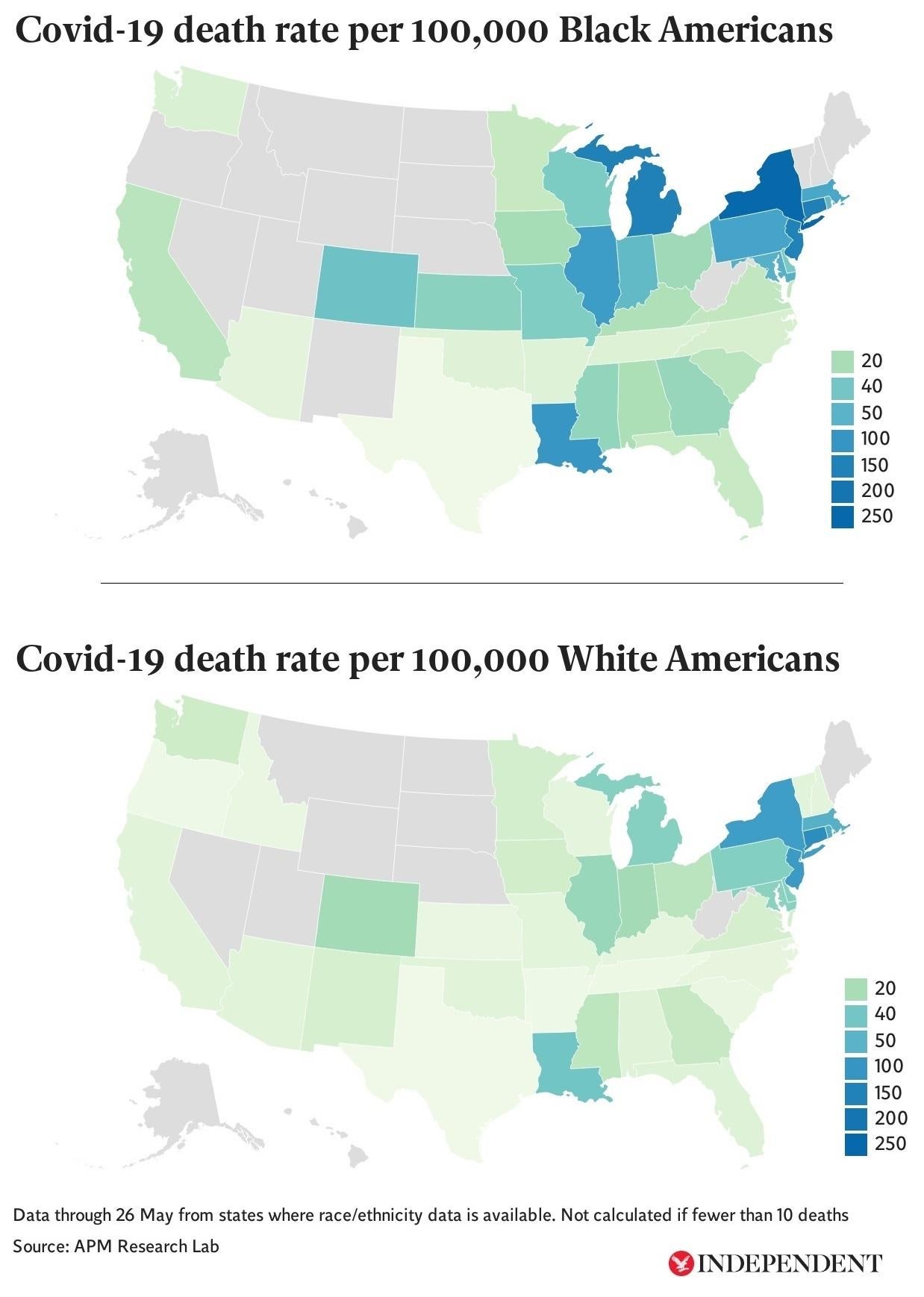Coronavirus tracked: How Covid-19 deaths in the UK compare by race and ethnicity
Data reveal ‘huge disparities in the health of our nation’
Your support helps us to tell the story
From reproductive rights to climate change to Big Tech, The Independent is on the ground when the story is developing. Whether it's investigating the financials of Elon Musk's pro-Trump PAC or producing our latest documentary, 'The A Word', which shines a light on the American women fighting for reproductive rights, we know how important it is to parse out the facts from the messaging.
At such a critical moment in US history, we need reporters on the ground. Your donation allows us to keep sending journalists to speak to both sides of the story.
The Independent is trusted by Americans across the entire political spectrum. And unlike many other quality news outlets, we choose not to lock Americans out of our reporting and analysis with paywalls. We believe quality journalism should be available to everyone, paid for by those who can afford it.
Your support makes all the difference.An investigation has been launched by the UK’s equality watchdog after recent data revealed that people from Bame backgrounds are up to twice as likely to die from the Covid-19 coronavirus in the UK than people of white British ethnicity.
A report from Public Health England in early June found that the death risk for people of Bangladeshi ethnicity is twice as high, while people of other Asian, black and Caribbean ethnicity are between 10 per cent and 50 per cent more likely to die from the virus.
These figures are not necessarily an indication that people of these ethnicities are more genetically predisposed to be vulnerable to Covid-19. Experts believe it is more likely to be a result of existing social and racial inequalities.
The investigation by the Equalities and Human Rights Commission (EHRC) aims to better understand “the loss of lives and livelihoods” of people from minority backgrounds.
It will address “serious issues that have yet to be fully answered” by the data relating to coronavirus deaths and race.
The 2 June report by Public Health England revealed the disproportionate impact of Covid-19 on people from all non-white ethnic minorities.
Health Secretary Matt Hancock said the coronavirus pandemic, which has resulted in more than 40,000 deaths in the UK, had “exposed huge disparities in the health of our nation”.
Previous data from NHS England in April revealed that black people accounted for 5.8 per cent of deaths from Covid-19, despite making up only 3.5 per cent of the population.
By contrast, white people accounted for 73.6 per cent of the deaths, despite making up more than 85 per cent of the population.
It is a similar story in the US, where the death rate of black Americans is nearly 2.5-times that of white Americans.
Figures gathered by APM Research Lab leading up to 26 May revealed the vast over-representation of black Americans from Covid-19 deaths, with data from individual states revealing even greater disproportionality.
Black residents in Kansas, for example, were seven-times more likely to have died from coronavirus than white residents.

There is no scientific evidence to suggest that the disproportionate impact of Covid-19 on Bame communities in the UK or black communities in the US is based on genetic differences between how the immune systems of different races and ethnicities react to viral infections.
There are, however, links between the socioeconomic status of different groups and their exposure to the virus. Lower income jobs like supermarket workers and care workers — the so-called frontline workers — are far more likely to come in contact with the coronavirus
“It is not necessarily because of their ethnicity, it may be related to their occupation or other reasons why they might be at higher levels of exposure,” Professor John Newton said at a press conference relating to the report by Public Health England.
The subsequent investigation by EHRC was described by the watchdog’s chairman as a “once-in-a-generation opportunity to tackle long-standing entrenched racial inequalities”.
EHRC chair David Isaac said: “Only by taking focused action to tackle race inequality across Britain will we become a fair country in which every individual can reach their full potential.
“This inquiry is part of our long-term strategic approach to tackle the structural inequalities that the coronavirus pandemic has laid bare.”
Join our commenting forum
Join thought-provoking conversations, follow other Independent readers and see their replies
0Comments